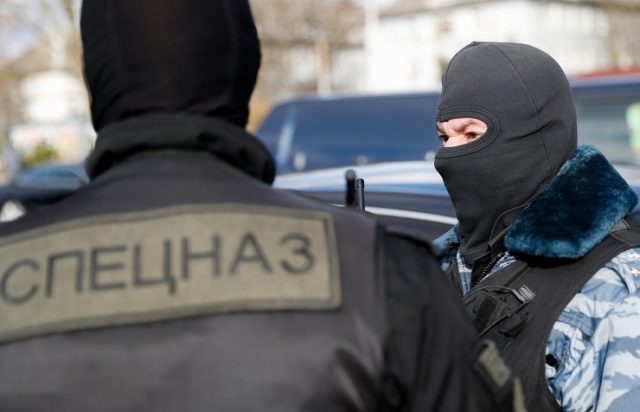
Moscow Makes Arrests of Dagestani Interior Ministry Officials
Publication: Eurasia Daily Monitor Volume: 13 Issue: 147
By:

On September 5, the Russian Federal Security Service (FSB) arrested Rasul Saduev, the head of the Criminal Investigations Department (Ugolovny Rozysk) of the Ministry of Interior in the Dagestani city of Khasavyurt. On the same day, the security services also arrested police colonel Gimbat Likhiyalov, who was a senior official in Dagestan’s Criminal Investigations Department. The details of the arrests are not entirely clear at this moment. But some sources in the security services claim that they may have been linked to the earlier arrest of the head of the police department in Kizilyurt, Askhabali Zairbekov. Others say that the arrests are connected to internal fights in Dagestan’s interior ministry. An alternative theory suggests that the attack on the police officials is meant to undermine the power of the city’s former mayor, Saigidpasha Umakhanov, who is currently employed as a minister in the government of Dagestan. The Russian federal authorities accuse the arrested men of abuse of power, extortion and even cooperation with the Dagestani insurgency (Kavkazskaya Politika, September 6).
Regardless of the reasons behind the apprehensions of top police officials in Dagestan, this case brings to light the inner world of the Dagestani police, as it has rarely been exposed before. Dagestan is one of the most volatile republics in the North Caucasus, and it has experienced the majority of the region’s insurgency-related violence in the past several years. Rights activists have long reported on rampant human rights violations in the republic, due to the protracted and unchecked abuse of power by government forces there. However, this time, due to infighting, government officials are exposing their colleagues themselves.
An anonymous source “close to law enforcement officials of Dagestan” told the Kavkazskaya Politika news agency that the FSB had followed Rasul Saduev for a long time. According to the source, Saduev started off his career as an ordinary police operative in the 1990s but had links to the criminal underworld from the onset of his employment. Saduev reportedly extorted money from cab drivers first, then from local casinos in Khasavyurt. Moreover, he allegedly maintained close ties with the Islamist insurgency in the republic, although it is unclear what exactly those ties entailed (Kavkazskaya Politika, September 6).
It is quite interesting that an anonymous security official would reveal to journalists that the FSB knew for years about the criminal background of a police official. And yet, despite their knowledge, it apparently took the authorities two decades to bring Saduev to justice. In reality, it is rather unlikely that Saduev or Likhiyalov were necessarily more corrupt than any other officials in the Dagestani interior ministry. In the Russian Federation, such attacks on top corrupt police officials are normally driven by higher political motivations.
Some local experts assert that the recent prosecution of several top Dagestani police officers was actually meant to increase the role of the Russian federal authorities in the region, which has traditionally been only weakly controlled by Moscow. One of the advocates for Moscow’s greater engagement in Dagestani affairs is a well-known journalist, Maksim Shevchenko. Shevchenko is an unusual character among Russian journalists because he is overtly pro-Kremlin and anti-Western but at the same time fiercely critical of the regional authorities in the North Caucasus. In particular, he has spoken out against cases of abuse of power by the republican police and security services. Despite his public criticism, Shevchenko has never come under attack by violent mobs or angry local officials, which routinely happens to independent Russian journalists. The unique ability of Maksim Shevchenko to openly criticize regional authorities in the North Caucasus while eluding expulsion from those territories is evidently related to formidable support for him in Moscow.
Shevchenko has a personal interest in Dagestan. During the current election campaign, he attempted to run for a seat in the Russian State Duma from Dagestan. But after his attempt failed, due to hostility from the regional authorities, he lashed out at the government in Makhachkala and the police in the republic. In particular, the journalist asserted that when republican governor Ramazan Abdulatipov told President Vladimir Putin that the Dagestani authorities had investigated the murders of several journalists in the republic, it was “a blatant, impudent and cynical lie.” Instead, officials purportedly connected to the killings of local journalists were promoted to government positions in the republic, according to Shevchenko (Onkavkaz.com, September 10).
The crackdown on the corrupt police officials in Dagestan may be part of a concerted effort by the Russian federal government to increase its influence in the remote republic, which has always been difficult to control for Moscow. By arresting top police officials, the Russian authorities may undercut the power of both the republican authorities and the chief of the republican police, Abdurashid Magomedov. Although relations between the interior ministry of Dagestan and the republican government have been quite rocky, they both united and prevented Maksim Shevchenko from running for a seat in the Russian parliament from the republic. Shevchenko’s election to the Russian State Duma from Dagestan would have been a precedent that could have opened up the North Caucasian republic’s political system to greater influence by Moscow. But since this did not work out as planned, a larger-scale crackdown may be expected in Dagestan soon.




